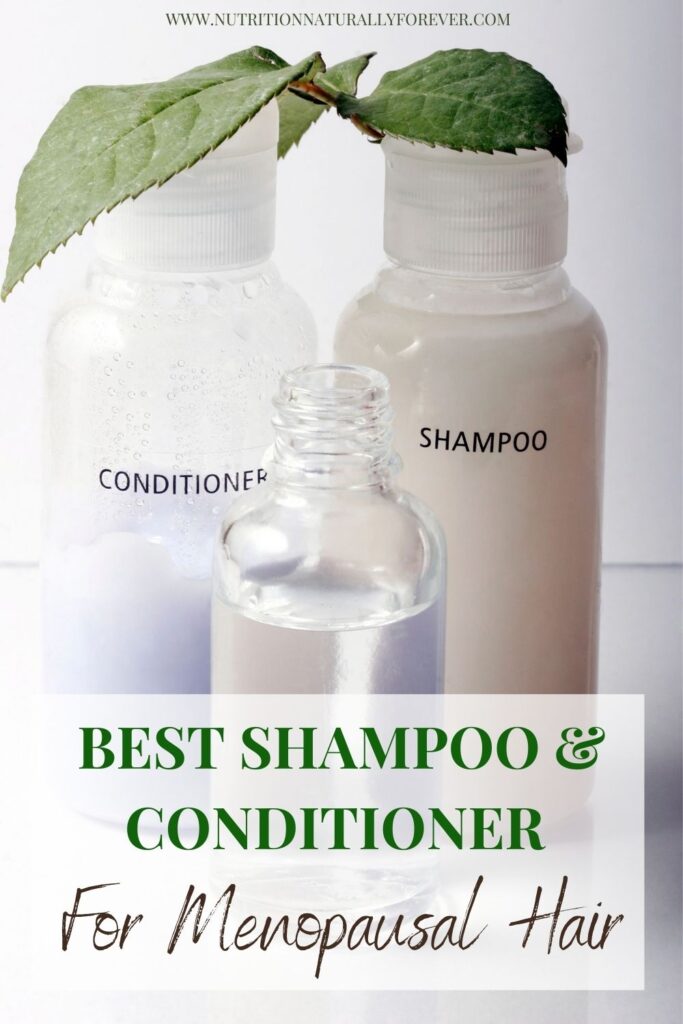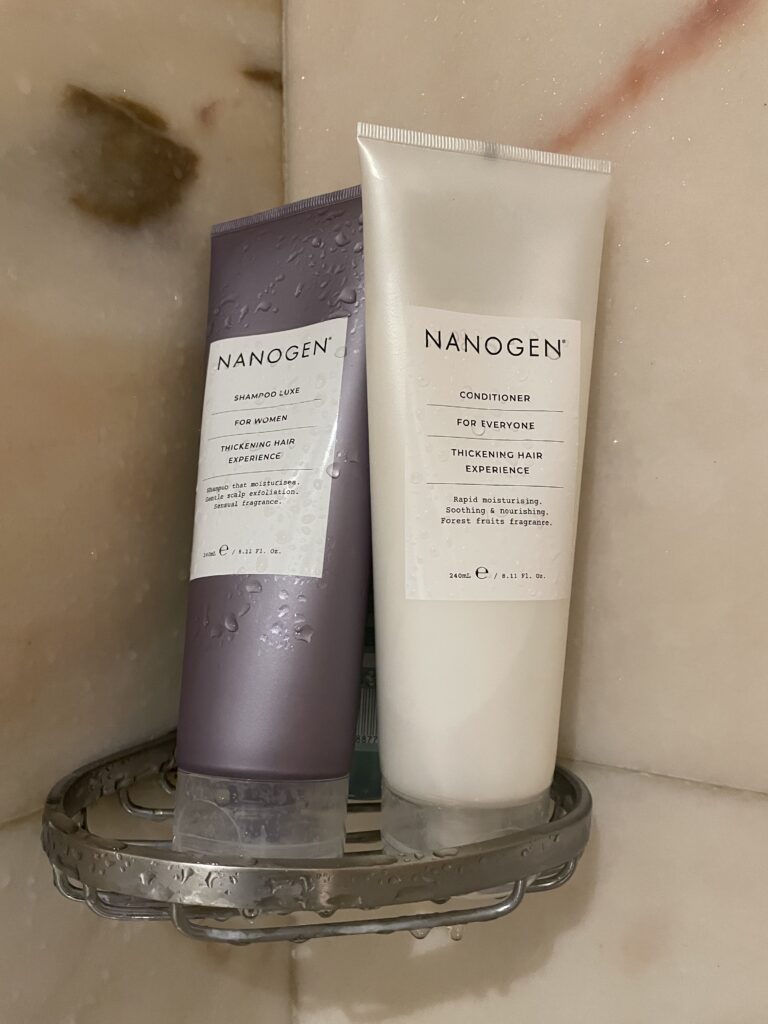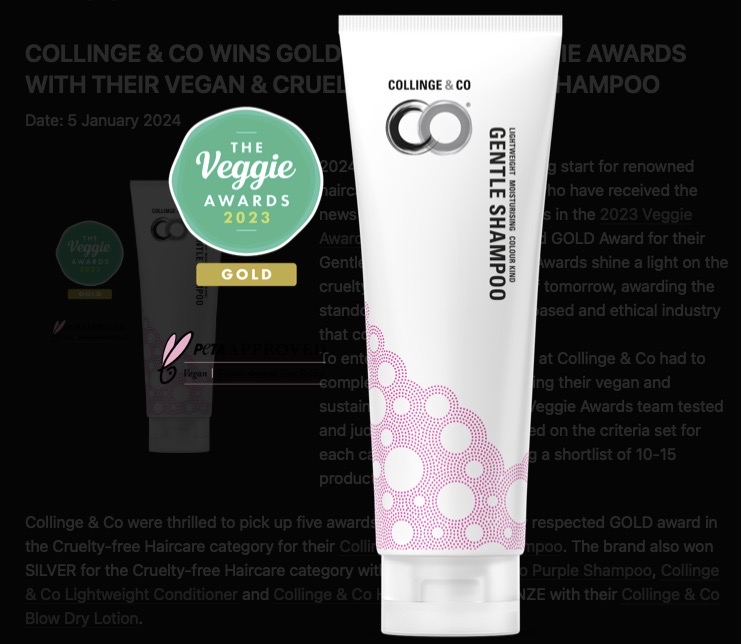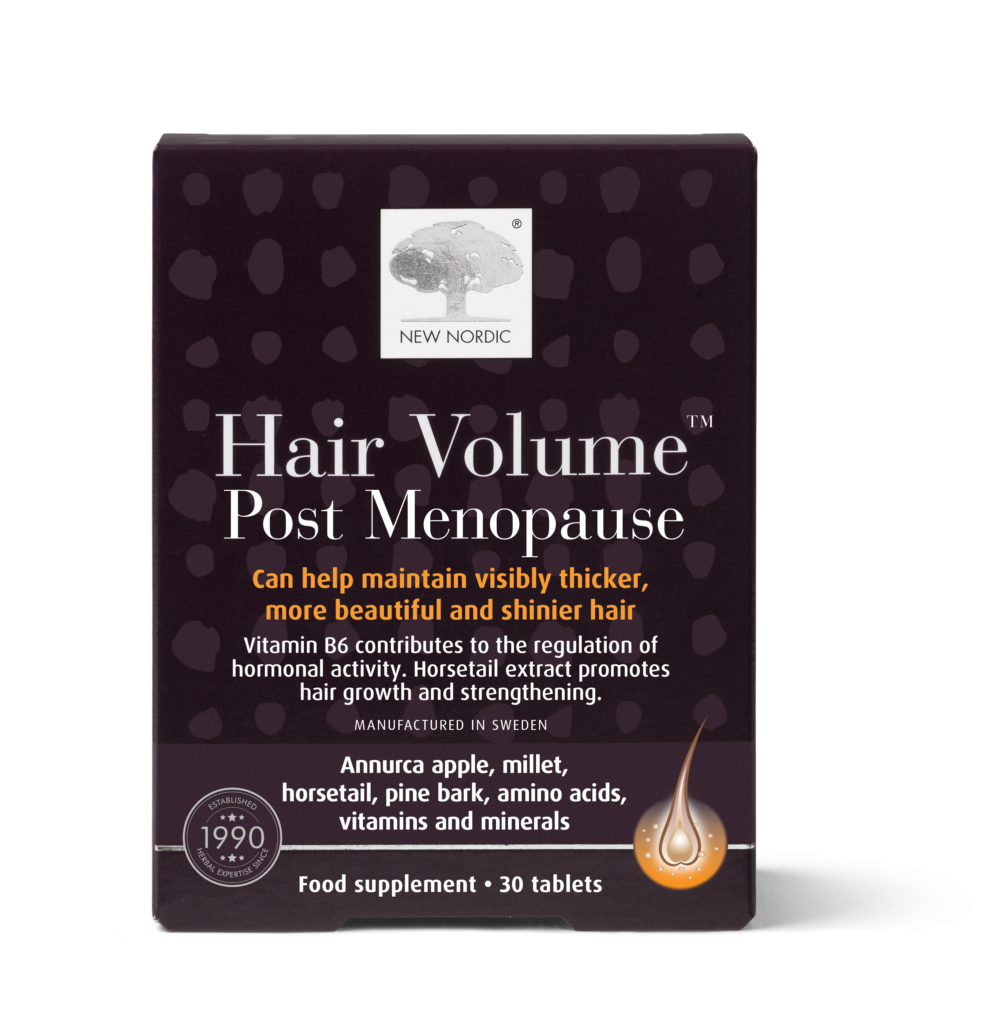
Best Shampoo and Conditioner for Menopausal Hair.
Hair loss is a common issue for women during menopause, with studies suggesting that up to two-thirds of women may experience some degree of hair thinning or loss during this stage of life.
Losing hair can have a significant emotional impact on women during menopause, leading to decreased self-esteem, anxiety, and depression.
Many women associate their hair with femininity and youthfulness, making hair loss during menopause particularly distressing and compounding negative thoughts about menopause.
While hair loss during menopause can be challenging this post will look at ways to naturally improve hair condition and reduce the severity of hair loss.
Causes of Menopausal Hair Loss
The effects of menopause are unique to each individual. From mood swings to night sweats and everything in between menopausal years are accompanied by many hormonal changes.
“Hair thinning is a common phenomenon among women as they age and approach menopause. It’s important to remember that though it can feel distressing, it is completely normal. There are several steps you can take to improve the overall health of your hair and reduce the appearance of hair thinning, however. So, no need to panic.
You can start by ensuring a balanced diet and managing stress. In addition, using hair care products designed for thinning hair can also help. If you’re especially worried, don’t hesitate to consult with a healthcare professional, trichologist, or a dermatologist to discuss potential treatment options.”
Dr Dilan Fernando, hair transplant surgeon, The Treatment Rooms London.
Menopause-related hair loss and hair thinning can be due to several factors, and understanding these can support you to create a plan and take action to achieve the best results.
Factors Contributing to Hair Loss;
- Hormone Imbalance
The primary cause of hair loss during menopause is hormonal fluctuations, particularly the decrease in estrogen levels.
Estrogen plays a key role in promoting hair growth and maintaining hair health.
As estrogen levels decline during menopause, hair follicles may become more sensitive to androgens like testosterone, leading to hair thinning and shedding.
Women experiencing hair loss during menopause typically notice a diffused hair thinning rather than the distinct pattern of baldness often seen in men. Hair may become noticeably thinner all over the scalp, with a widening parting or a decrease in hair density.
- Medications & Conditions
Certain medications can also increase hair loss such as painkillers, antidepressants and blood pressure treatments.
Underlying Thyroid issues could be the reason you are experiencing hair loss, this can be considered a hormonal issue but could also just be a case of giving your liver some TLC.
Menopausal hair loss may also be exacerbated by a condition called Telogen Effluvium, which is characterised by a significant shedding of hair. More information on this condition is below.
Scalp conditions such as dandruff, seborrheic dermatitis, and psoriasis, can contribute to scalp inflammation and itching. Chronic scalp inflammation may disrupt the hair growth cycle and compromise the health of hair follicles.
A compulsive behaviour known as trichotillomania, where individuals repeatedly pull out their hair, leading to noticeable hair loss and bald patches can often be a coping mechanism for managing stress, anxiety, or other emotional distress.
- Stress
Chronic stress can disrupt the normal hair growth cycle, leading to an imbalance between hair growth (anagen phase) and hair shedding (telogen phase). This disruption can result in a condition known as telogen effluvium, where a larger-than-normal number of hair follicles enter the resting (telogen) phase simultaneously, causing increased hair shedding.
Prolonged stress can also inhibit the proliferation of hair follicle stem cells and disrupt the signals that regulate hair growth. High levels of the stress hormone cortisol, can suppress the activity of hair follicle cells involved in hair growth, leading to slower hair growth rates and thinner hair shafts.
- Nutritional Deficiencies
Impaired nutrient absorption and utilisation in the body due to lack of nutrients in the diet or poor gut health will lead to nutritional deficiencies in essential vitamins and minerals that are vital for maintaining healthy hair, such as vitamin D, vitamin B complex, iron, and zinc.
Nutritional deficiencies can weaken hair follicles and contribute to hair thinning and loss.
Natural Treatments for Menopausal Hair
Before I move on to products there are some natural strategies you can apply in the first instance to see if you notice any improvement;
- Prevent drying and hair breakage by staying away from heat tools such as straighteners, tongs and hairdryers on a high heat setting.
- Keep hair out of chlorine if you swim
- Reduce artificial chemicals via hair dyes, investigate non-toxic dyes for colour-treated hair or embrace your natural colour.
- Avoid extensions which can cause breakage
- Protect your hair from weather extremes with a hat
- Create a hair care routine with a good mix of natural treatments such as coconut oil, essential oils or leave-in conditioners.
Shampoo and Conditioner for Menopausal Hair
During my research over the past couple of months for this post I have been testing some shampoo and conditioner samples to treat thinning hair and hair loss.
I have been delighted with the result, read more below and follow any highlighted links to discover more in-depth product information.

Nanogen, are expert in thinning hair and hair loss.
They have a full product range committed to overall hair and scalp care. All of our products have been formulated to support thinning hair, be that their line of shampoos and conditioners which have been tailored to nourish, exfoliate and support the scalp and hair, their hair fibres which give instant thickness and volume upon each application to their newly launch Hair Growth Factor Serum, which, using a unique blend of growth factors works in harmony with the natural hair growth cycle to aid the healthy growth of hair.
Their fibres are made from 100% natural keratin, the protein found in real hair, and their range of shampoos and conditioners are all SLS and Paraben-free. They gently cleanse and exfoliate, taking care of both scalp and hair, and promoting healthy hair growth.

The shampoo and conditioner smell divine, as they are free from sulphates and parabens they don’t foam up easily. I found that a pre-wash with just a tiny amount of product took most dirt and grease away so that another small amount allowed more bubbles to form.
The conditioner is lightweight but substantial enough to leave your hair feeling nourished.
The scent from both products was fresh and fruity and could be smelt all day. I used these products while I was away for a cheeky little winter sun, my hair felt and looked full and bouncy, I will certainly be replenishing my stocks!
Collinge & Co (vegan & cruelty-free) are a high-performing hair care brand with a fantastic range of products;

Gentle Shampoo – Gentle Shampoo is specially formulated to be kind to hair that needs extra T.L.C. or for those of you who wash your hair more frequently. It is sulphate-free and kind to hair, helping to protect colour and retain moisture. It is lightweight so as not to weigh the hair down and has natural ingredients that condition and strengthen the hair, protects against harmful UV rays and help to prevent colour fade.
Lightweight Conditioner – Lightweight Conditioner is ideal for hair that needs moisture without being too heavy, leaving hair manageable, smooth and silky. It has natural ingredients to promote healthy hair, protect colour and help to prevent breakage and split ends.
Blowdry Lotion – Our light non-sticky blow dry lotion creates light hold, and shine and adds volume to hair. Made with UV filter and heat protection to maintain the condition and vibrancy of your hair. It helps create beautiful big hair with body, volume and shine.
Hair Moisturiser – Great for heat protection and shine. Infused with Argan Oils to hydrate, smooth and detangle your hair. It is a leave-in conditioner great for curly or straight hair. It works well as a leave-in conditioner for dry or dull hair. Argan Oil Argan-infused hair Moisturiser is a fantastic everyday hair care product for revitalising and calming down frizzy, unruly hair. It is perfect for someone who wants healthy, shiny hair but with a no-product feel.
Hair Treat – Hair Treat is an intense moisturising and colour-protecting mask that will leave your hair feeling healthy, manageable and silky smooth. Luxury natural ingredients will nourish and strengthen hair and help to prevent breakage and split ends. It should be used as part of your hair beauty regime to revitalise your hair once a week or as needed.
Any product that includes Sandalwood has my vote, I love the heady scent. The shampoo and conditioner complimented each other well, I have fine hair which I colour treat so need something that will protect from colour fading but also light enough not to be weighed down. The results after drying and styling were manageable hair that felt smooth and full.
Nutrition for Menopausal Hair
I like to treat menopause symptoms at their root cause.
For menopause hair loss and hormone disruption hair care products are a great part of a multi-pronged strategy.
Menopause is a natural stage of a woman’s life, it is not a disease to be cured and there is no getting away from the fact that the ovaries have done their job and are off to retirement along with our main supply of estrogen.
That being said your body still produces estrogen from the adrenal glands and fat cells and we have estrogen receptors all over the body.
During this later stage of life, it is even more important to make sure you are nourishing your body with enough protein and healthy fat so your body has the raw materials it needs to build new cells for growth and repair along with micronutrients to increase antioxidants to fight free radicals and inflammation.
Here are my top 6 nutrients for menopausal hair health along with real food sources;
Omega-3 Fatty Acids:
Omega-3 fatty acids found abundantly in fatty fish like salmon, walnuts, and flaxseeds, are essential for maintaining scalp health and promoting hair growth. These fatty acids have anti-inflammatory properties that help reduce scalp inflammation, which can contribute to hair loss. Omega-3s also support the production of natural oils that keep the scalp and hair hydrated.
Biotin:
Biotin, also known as vitamin B7 or vitamin H, is a water-soluble vitamin that plays a crucial role in the metabolism of fats, proteins, and carbohydrates. Biotin is widely recognised for its role in promoting healthy hair, skin, and nails. It helps strengthen the hair shaft, prevent breakage, and stimulate hair growth. Biotin-rich foods include eggs, nuts, seeds, and leafy green vegetables.
Vitamin E:
Vitamin E is a powerful antioxidant that helps protect the scalp and hair follicles from oxidative stress and damage caused by free radicals. It promotes blood circulation to the scalp, which ensures adequate nutrient delivery to the hair follicles for optimal growth. Vitamin E also helps maintain the integrity of cell membranes, including those of the hair follicles, thereby supporting healthy hair growth. Good dietary sources of vitamin E include almonds, sunflower seeds, spinach, and avocados.
Iron:
Iron deficiency, often characterised by anaemia, is a common cause of hair loss, particularly in women. Iron is essential for the production of haemoglobin, which carries oxygen to the body’s cells, including the hair follicles. Insufficient iron levels can lead to poor oxygenation of the scalp, resulting in weakened hair follicles and increased hair shedding. Incorporating iron-rich foods such as lean meats, poultry, beans, lentils, and fortified cereals can help prevent iron deficiency and support hair health.
Collagen:
Collagen is the most abundant protein in the body and is essential for maintaining the strength and elasticity of the skin, hair, and connective tissues. As women age, collagen production naturally declines, leading to changes in skin and hair texture. Supplementing collagen peptides can help support hair growth and thickness by providing the necessary building blocks for healthy hair follicles. Additionally, collagen helps improve scalp health and hydration, which is essential for promoting optimal hair growth.
Vitamin C:
Vitamin C is a powerful antioxidant that plays a vital role in collagen synthesis, which is essential for maintaining the structure and integrity of the hair shaft. Vitamin C also aids in the absorption of iron, facilitating its transport to the hair follicles for optimal hair growth. Citrus fruits, strawberries, kiwi, bell peppers, and broccoli are excellent sources of vitamin C that can help support healthy hair during menopause.
Discover more about menopause and nutrition in my Menopause Nutrition Guide, 5 Nutrients Your Body Needs During Menopause. Download for free HERE.
Supplements for Menopausal Hair
I always encourage my clients to get as much nutrition from real food, this is the most bioavailable way for our body to absorb the nutrients it needs, however, a supplement may be needed now again to fill nutritional gaps or provide a larger dose of certain nutrients it would be difficult to get enough of from food.
Use the real food nutrition examples above when considering a supplement. Focus on quality, and do your research, many of the supplements you can purchase in supermarkets are a waste of money.
I use and recommend collagen supplements. I have found the powdered versions to be better quality and more economical. Check the ingredients to make sure they don’t contain any artificial ingredients, GMO or fillers.

New Nordic are a Scandinavian provider of natural health supplements and beauty products. They have a range of hair care products including Hair Volume™ Post Menopause which is based on an annurca apple extract with natural procyanidin B2. The tablet contains the same ingredients as the original Hair Volume™ plus B vitamins and maritime pine bark. Hair Volume™ Post Menopause tablets have a high content of vitamin B6, which contributes to regulating female hormones.
Aloe Vera is a wonderful addition to a healthy lifestyle. The inner leaf gel provides a unique combination of nutrients which contributes to reducing inflammation in the body.
Final Word
As you embrace the changes that come with menopause, you can take proactive steps to care for your hair.
Taking care to choose hair care products without harsh chemicals supports the overall goal of nurturing your body through menopause and embracing its beauty at every stage of life.
With patience, consistency, and a holistic approach to hair care, you can confidently embrace your journey through menopause with healthy, radiant hair.
Here’s to celebrating the beauty of Wild Women, may these tips empower you to navigate menopausal hair changes with grace and confidence.
If you would like to chat with me about your unique menopause transition, book a Wild Well-Being call and come away inspired and motivated to begin your journey to optimal health.

I just bought some of the Nanogen shampoo and conditioner to try 😀
Was that a coincidence or from reading this post? What do you think of these products?